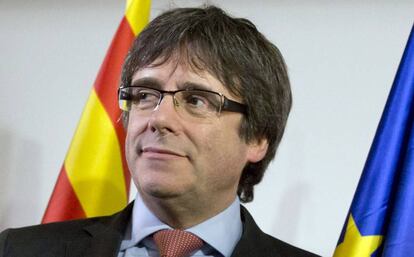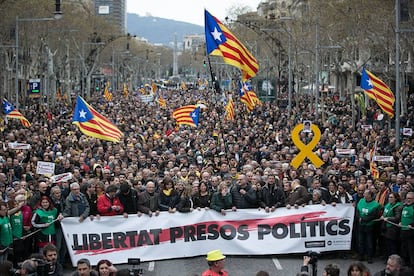Carles Puigdemont detained by German police
Former Catalan premier is due to appear before a district judge in Schleswig-Holstein on Monday

Former Catalan premier Carles Puigdemont was detained by German police as he crossed the border from Denmark on Sunday. The detention comes after the European arrest warrant for the ousted premier was reactivated on Friday.
He is due to appear before a judge this afternoon, although a decision whether or not to extradite Puigdemont to Spain will “probably” not be made until after the Easter holidays, said Wiebke Hoffelner, the spokeswoman for the prosecutor’s office at the Schleswig Holstein High Court.
Protests in Barcelona.
Hoffelner added that the former leader’s afternoon court hearing will be held behind closed doors “for security reasons.”

According to the German federal police, Puigdemont was arrested at 11:17am at a gas station between the municipalities Schuby and Jagel, 30 kilometers south from the border of Denmark. Puigdemont’s car had been fitted with a geopositioning tracking device and 12 members of Spain’s intelligence services had been trailing him from Brussels to Helsinki and back, the news agency Efe reported.
Puigdemont was stopped on the A7 highway by officers from the Schleswig Holstein regional police force and taken to a station, informed local police spokesperson Uwe Keller. The sacked premier was traveling in a Renault Espace with four other passengers, whose identities have not yet been revealed. The car was heading towards Hamburg and from here the Catalan independence leader had planned to return to his residence in Waterloo in Belgium, where he has been living in self-imposed exile since late October.
Puigdemont is now under “provisional detention” at the Neumünste prison, north of Hamburg, according to German news agency DPA. Thousands of people protested in Barcelona on Sunday against his arrest.
Judicial authorities in Schleswig Holstein have 60 days to make a decision regarding his extradition, said sources at the German justice ministry. The former Catalan leader is scheduled to appear before a German district judge on Monday. This judge will make an initial decision on extradition, and may request pre-trial detention while the Superior Court makes a final decision within 60 days. Once extradition has been agreed on, it must be carried out within 10 days.
Helsinki
On Friday morning Puigdemont had attended a conference in Helsinki, Finland. From there he traveled to Denmark, then continued his journey by car back to Belgium, where he had established his residence in the city of Waterloo.
Although intelligence services had been following his trail from Finland, Spanish security sources said that a decision was made to have Puigdemont arrested in Germany rather than Denmark because Spain and Germany have close cooperation ties, and because the latter country’s penal code includes a crime that is similar to Spain’s concept of rebellion.
Puigdemont fled to Brussels in late October to avoid facing charges of sedition, rebellion and misuse of public funds for his involvement in the unilateral declaration of Catalan independence. Under the German criminal code, a similar crime – described as the act “by force or through the threat of force (...) to undermine the continuity of the Federal Republic” or “to modify the constitutional order” – carries a punishment of between 10 years in prison and life imprisonment. “Less serious cases” can be punished with between one and 10 years in prison, according to Article 81 of the German criminal code, reports EL PAÍS journalist Fernando J. Pérez.
Belgium’s criminal code, by contrast, does not have an equivalent of Spain’s rebellion, making it harder to comply with the condition of “double criminality,” meaning that the criminal offense for which the suspect is wanted by a state must also exist in the state that receives the request. This made Belgium a good refuge for Puigdemont, who had been planning to turn himself in to authorities there following the reactivation of the arrest warrant on Friday.
Spanish security forces say that Germany, along with France, Italy and Portugal, is one of the most actively cooperative partners. In 2015, Germany carried out 1,635 arrest warrants.
English version by Melissa Kitson and Susana Urra.
Tu suscripción se está usando en otro dispositivo
¿Quieres añadir otro usuario a tu suscripción?
Si continúas leyendo en este dispositivo, no se podrá leer en el otro.
FlechaTu suscripción se está usando en otro dispositivo y solo puedes acceder a EL PAÍS desde un dispositivo a la vez.
Si quieres compartir tu cuenta, cambia tu suscripción a la modalidad Premium, así podrás añadir otro usuario. Cada uno accederá con su propia cuenta de email, lo que os permitirá personalizar vuestra experiencia en EL PAÍS.
¿Tienes una suscripción de empresa? Accede aquí para contratar más cuentas.
En el caso de no saber quién está usando tu cuenta, te recomendamos cambiar tu contraseña aquí.
Si decides continuar compartiendo tu cuenta, este mensaje se mostrará en tu dispositivo y en el de la otra persona que está usando tu cuenta de forma indefinida, afectando a tu experiencia de lectura. Puedes consultar aquí los términos y condiciones de la suscripción digital.








































